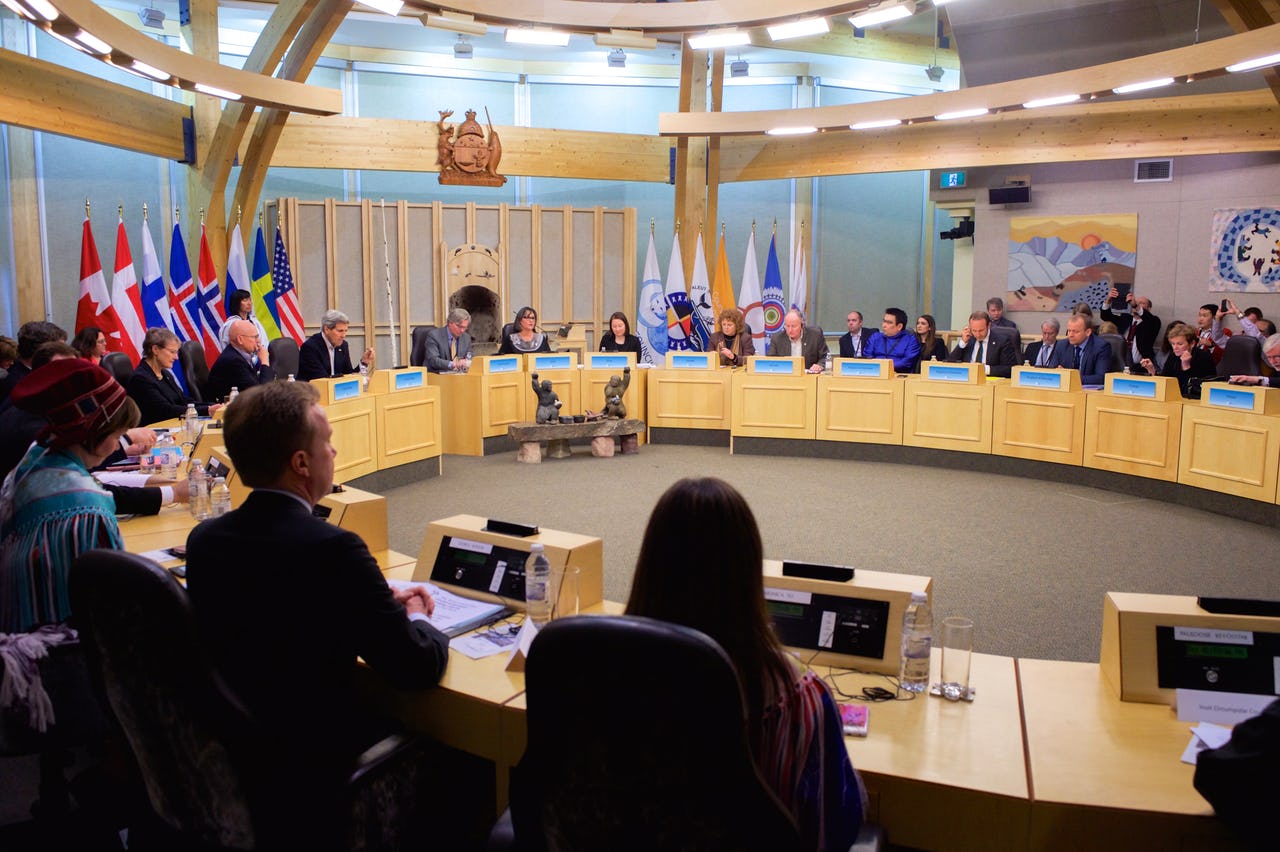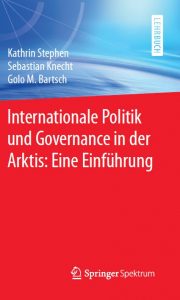International Politics and Governance in the Arctic - An Introduction

U.S. Secretary of State John Kerry sits with members of the Arctic Council in Iqaluit, Canada, just below the Arctic Circle, amid a series of meetings by the group on April 24, 2015. Photo: U.S. Department of State
For the first time in a German-language textbook, the history, actors, institutions, and processes of international Arctic politics and governance are analysed clearly and comprehensibly against the background of various policy fields and theories of International Relations. Questions such as “What constitutes the Arctic as a region in international relations?”, “Which actors and institutions play a role in Arctic governance?”, “What significance do resources and shipping routes have in an increasingly accessible Arctic?”, and “What environmental and safety concerns are associated with a warmer Arctic?” are at the centre of current scientific and political debates addressed in this book. It thus offers beginners as well as advanced scholars of Arctic politics and governance an orientation between the historical romanticisation of the Arctic region as no man’s land and its current characterisation as an impending conflict area.
The book examines various concepts and theoretical approaches from International Relations, international law, and political geography – including neorealism, neoliberal institutionalism, social constructivism, critical and neoclassical geopolitics, regionalism and multilevel governance – and tests them for their explanatory power of political processes in the areas of resource, environmental, and security governance. It thus provides academic and practical orientation for anyone interested in understanding international relations in the Arctic on the basis of concrete theoretical assumptions, and provides suggestions and impulses for future research.
The book has been published in German by Springer Spektrum with the title “Internationale Politik und Governance in der Arktis – Eine Einführung” and can be ordered here.
Introduction
Globalisation and climate change are driving factors behind the complex changes in the Arctic. This region is a prime example for the interaction between nature and social scientific processes in times of the Anthropocene. The central actors in the Arctic are the eight arctic states Denmark, Finland, Iceland, Canada, Norway, Russia, Sweden, and the USA. The region has a history of settlements which reaches back thousands of years. In the beginning seen as a mystical place, the Arctic was then explored by seafaring tribes and developed through international maritime trade and research expeditions. During the Second World War and the Cold War, the Arctic for the first time became a site of military activities. Since the 1990s, the region has been characterised by stable and institutionalized cooperation. Nowadays, the meaning of the melting Arctic stems especially from its role as an early warning system for global climate change, from the immense impacts on its natural environment, and its possible economical potential.
Actors inside and outside the region
The players of Arctic governance can be classified by their geographic location in Arctic and non-Arctic actors, as well as by their status as governmental and non-governmental actors. The definition of the southern borders of the Arctic and the regulation of who and what is to be considered “Arctic”, is a social construct used to regulate the political order for this region. Russia stands out of the group of the eight Arctic states with territory north of the Arctic Circle, as the geographically largest Arctic country. All eight states have published Arctic strategies or guidelines, in which they describe the standing of this region for their foreign policy. The indigenous peoples of the Arctic have an outstanding political standing in Arctic governance, for example due to their colonial history as well as their strong position in the Arctic Council, the central political forum of the region. Many non-Arctic states have shown interest in the development of the Arctic over the past years. This resulted in a significant increase of observer states in the Arctic Council. Non-governmental actors primarily fulfil three functions in the Arctic policy process: Agenda-Setter, Watchdog and Implementer.
Institutions and Governance structures
The Arctic Governance framework is a complex arrangement of relevant institutions on the international, regional, and sub-national level. Arctic Governance includes Arctic-specific regulations as well as Arctic-relevant agreements, which either do not explicitly mention the Arctic or include it in their geographical scope, but which are nevertheless relevant for the Arctic due to their regulatory content. The United Nations Convention on the Law of the Sea (UNCLOS), which regulates the extent of sovereign rights of coastal states, and the Arctic Council, which is seen as the central political forum of the region, play a central role in the Arctic Governance framework. Additionally, the numerous conventions issues by the International Maritime Organisation as well as numerous Regional Fisheries Management Organisations are part of the Arctic Governance structure. The rapid climatic and social changes unfolding in the North are putting Arctic-specific and Arctic-relevant intuitions alike, especially the form and function of the Arctic Council, increasingly under adaptation pressure.
Scientific Approaches: The Arctic in the focus of international relations
In comparison to other regions, the Arctic is far from being an obviously coherent region. The debate concerning the regionness of the Arctic is influenced by the paradigms “global vs. regional Arctic” and “Arctic exceptionalism vs normalism”. Furthermore, we frequently encounter geopolitical disputes, which in the first generation concerned predominantly conflicts about territory and resources, and in a second focused on the influence of global developments on Arctic cooperation. Critical geopolitics confronts these approaches with a focus on the social construction of geopolitical world views. Neorealism expects an increasing danger of military confrontations between the Arctic Ocean rim states. In contrast, neoliberal institutionalism offers a certain optimism when it comes to intergovernmental cooperation and peace in the Arctic. Social constructivism allows the conceptual inclusion of norms, identities, and imaginations for the analysis of Arctic politics. This comes along with the possibility of change of actors’ interests and institutions, which allows a generally more optimistic view on the international relations of the Arctic.
Empirical Examples
In addition to mineral raw materials, oil and gas deposits, international and regional shipping, and fishing are at the centre of the debate on Arctic resources. The possible access to thus far unexplored Arctic oil and gas resources has led to a media hype on the possibility of a new energy resource hotspot in the Arctic. Arctic shipping routes are becoming more and more navigable for regional and transit shipping between the Atlantic and Pacific Ocean. Due to climate change, there is the possibility that Arctic fish species will experience significant change with according effects on fishing opportunities in Arctic regions. All of these developments are still subject to large uncertainties as well as considerable risks for people and the environment in the Arctic. The weak environmental regime in the Arctic is to a large extent made up for through international agreements and institutions, which could prove more effective as many environmental pollutants stem from outside the Arctic. The use of the term ‘security’ varies in Arctic research. The understanding of security reaches from traditional understandings with a focus on military security, to broad concepts such as human security.
Conclusion
By applying different theoretical approaches from political science to the Arctic, this book could show that for the dynamically developing phenomena and problems of this region there are sometimes well-fitting explanatory theoretical approaches and other times less fitting ones. For future research on international politics and governance in the Arctic, the authors view, next to scientific excellence, especially the comprehensibility and embedding of social science Arctic research as a major task. This is useful to provide expertise for an interested public and to influence discussions in the media about the Arctic. On the other hand, there should be increasing possibilities for more interdisciplinary research on the Arctic including social and natural science expertise.
Sebastian Knecht is PhD candidate at the Berlin Graduate School for Transnational Studies (BTS) at Freie Universität Berlin. Dr. Golo M. Bartsch is staff officer and political consultant at the European External Action Service (EEAS) in Brussels.
